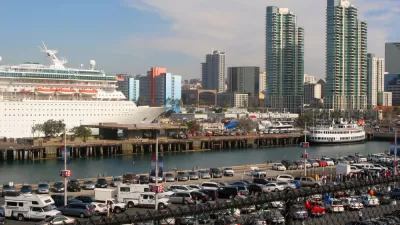A sand mine that has been operating since the very beginning of the 20th century has finally been shut down by California regulators. The site of the facility will be returned to more natural conditions.

Paul Rogers reports: "The last coastal sand mine in the United States, a Monterey Bay plant that scientists say has caused significant erosion of beaches in the area, will close in three years under a settlement agreement announced Tuesday with California officials."
The facility, the CEME Lapis plant has been operating with a license from the state, "claiming that its operations pre-date state laws such as the 1976 Coastal Act," according to Rogers. The facility produces an estimated 200,000 to 300,000 cubic yards of sand a year.
The turning point in the state's protracted battle against the facility came in May 2017, when the California State Lands Commission threatened legal action against the company. "The company already was under investigation from the California Coastal Commission and was facing years of protracted litigation and potential fines," according to Rogers.
For more on the end of the last coastal sand mine in the United States from the standpoint of some of the advocates who fought the facility, see a post by Jennifer Savage for the Surfrider Foundation.
FULL STORY: Controversial beachfront sand mining operation along Monterey Bay to close

Alabama: Trump Terminates Settlements for Black Communities Harmed By Raw Sewage
Trump deemed the landmark civil rights agreement “illegal DEI and environmental justice policy.”

Planetizen Federal Action Tracker
A weekly monitor of how Trump’s orders and actions are impacting planners and planning in America.

How Atlanta Built 7,000 Housing Units in 3 Years
The city’s comprehensive, neighborhood-focused housing strategy focuses on identifying properties and land that can be repurposed for housing and encouraging development in underserved neighborhoods.

In Both Crashes and Crime, Public Transportation is Far Safer than Driving
Contrary to popular assumptions, public transportation has far lower crash and crime rates than automobile travel. For safer communities, improve and encourage transit travel.

Report: Zoning Reforms Should Complement Nashville’s Ambitious Transit Plan
Without reform, restrictive zoning codes will limit the impact of the city’s planned transit expansion and could exclude some of the residents who depend on transit the most.

Judge Orders Release of Frozen IRA, IIJA Funding
The decision is a victory for environmental groups who charged that freezing funds for critical infrastructure and disaster response programs caused “real and irreparable harm” to communities.
Urban Design for Planners 1: Software Tools
This six-course series explores essential urban design concepts using open source software and equips planners with the tools they need to participate fully in the urban design process.
Planning for Universal Design
Learn the tools for implementing Universal Design in planning regulations.
Jessamine County Fiscal Court
Caltrans
Institute for Housing and Urban Development Studies (IHS)
City of Grandview
Harvard GSD Executive Education
Toledo-Lucas County Plan Commissions
Salt Lake City
NYU Wagner Graduate School of Public Service





























